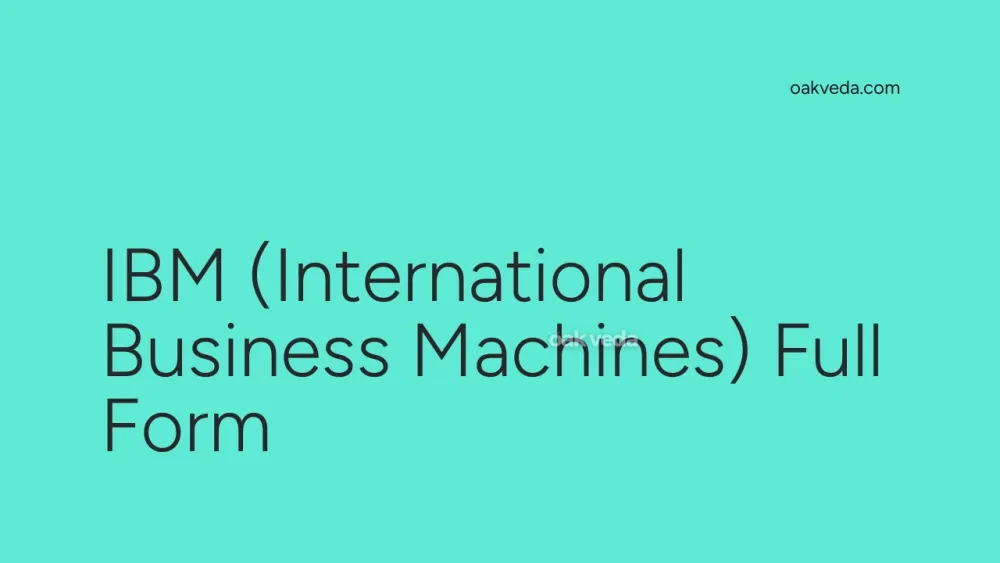
What is the Full Form of IBM?
The full form of IBM is International Business Machines. This renowned multinational technology corporation has been at the forefront of innovation for over a century, shaping the global IT landscape with its groundbreaking products and services.
What is International Business Machines?
International Business Machines, commonly known as IBM, is a world-leading technology company that specializes in cloud computing, artificial intelligence, data analytics, and IT infrastructure. Headquartered in Armonk, New York, IBM operates in more than 170 countries, providing a wide range of hardware, software, and consulting services to businesses and organizations worldwide.
Origin and Development of International Business Machines
The story of IBM begins on June 16, 1911, when Charles Ranlett Flint founded the Computing-Tabulating-Recording Company (CTR). This company was formed through the merger of three existing businesses:
- Tabulating Machine Company
- International Time Recording Company
- Computing Scale Company
In 1924, CTR was renamed International Business Machines, giving birth to the IBM we know today. This name change reflected the company's growing global presence and its expanding focus on business machines beyond just tabulating equipment.
Throughout its history, IBM has been responsible for numerous technological breakthroughs:
- 1950s: Introduction of the IBM 701, the company's first production computer for general use
- 1957: Creation of FORTRAN, a pioneering programming language
- 1956: Launch of the first hard drive (305 RAMAC)
- 1967: Introduction of the floppy disk
- 1981: Release of the IBM Personal Computer (IBM PC)
These innovations, among many others, have cemented IBM's place as a leader in the technology industry.
How does International Business Machines work?
IBM operates as a comprehensive technology and consulting company, offering a wide array of products and services. The company's business model is built on several key pillars:
-
Research and Development: IBM invests heavily in R&D, maintaining research laboratories worldwide to drive innovation.
-
Hardware and Software Production: The company designs and manufactures a range of hardware products and develops software solutions for various industries.
-
Cloud Services: IBM provides cloud computing platforms and services to businesses of all sizes.
-
Consulting Services: Through its Global Business Services division, IBM offers strategic consulting to help organizations optimize their operations and leverage technology effectively.
-
Artificial Intelligence: IBM's Watson platform showcases the company's commitment to AI and machine learning technologies.
Types of International Business Machines Services
IBM offers a diverse portfolio of services, including:
-
Cloud and Cognitive Software: Encompassing cloud platforms, AI applications, and data analytics tools.
-
Global Technology Services: Providing IT infrastructure services, technical support, and resiliency services.
-
Global Business Services: Offering consulting, application management, and global process services.
-
Systems: Developing servers and storage systems for hybrid cloud deployments.
-
Global Financing: Providing lease and loan financing to clients and business partners.
Functions of International Business Machines
IBM's primary functions include:
- Developing and manufacturing cutting-edge technology products
- Providing cloud computing and AI solutions
- Offering IT consulting and implementation services
- Conducting advanced research in emerging technologies
- Supporting businesses in their digital transformation journeys
Applications of International Business Machines
IBM's technologies and services find applications across various sectors:
- Healthcare: Improving patient care through AI-powered diagnostics and data analytics
- Finance: Enhancing security and efficiency in banking and financial services
- Retail: Optimizing supply chains and personalizing customer experiences
- Government: Modernizing public services and improving citizen engagement
- Education: Advancing learning through AI-powered educational tools
Features of International Business Machines
Key features that set IBM apart include:
- Innovation Leadership: Consistently at the forefront of technological advancements
- Global Reach: Extensive presence in over 170 countries
- Diverse Portfolio: Offering a wide range of products and services
- Strong Research Focus: Maintaining numerous research facilities worldwide
- Commitment to Sustainability: Implementing environmentally friendly practices in operations
Benefits of International Business Machines
Businesses partnering with IBM can enjoy several benefits:
- Access to cutting-edge technology solutions
- Comprehensive IT support and consulting services
- Scalable cloud computing platforms
- Advanced AI and data analytics capabilities
- Robust security solutions to protect sensitive information
Limitations or Challenges of International Business Machines
Despite its strengths, IBM faces some challenges:
- Intense competition in the rapidly evolving tech industry
- The need for continuous innovation to maintain market relevance
- Adapting to changing customer preferences and technological trends
- Balancing traditional hardware business with growing cloud and AI sectors
Future Developments in International Business Machines Technology
Looking ahead, IBM is focusing on several key areas:
- Quantum Computing: Developing practical applications for quantum computers
- Hybrid Cloud Solutions: Expanding offerings for multi-cloud environments
- AI and Machine Learning: Enhancing Watson and other AI technologies
- Blockchain: Exploring new use cases for distributed ledger technology
- Edge Computing: Developing solutions for processing data closer to its source
FAQs on IBM Full Form
-
What does the full form of IBM represent? The full form of IBM is International Business Machines.
-
When was IBM founded? IBM was founded on June 16, 1911, as the Computing-Tabulating-Recording Company (CTR). It was renamed IBM in 1924.
-
What are IBM's main business areas? IBM's main business areas include cloud computing, AI, data analytics, IT infrastructure, and consulting services.
-
Who founded IBM? Charles Ranlett Flint founded the company that would become IBM.
-
What was IBM's first personal computer called? IBM's first personal computer was simply called the IBM Personal Computer (IBM PC), launched in 1981.
In conclusion, the full form of IBM - International Business Machines - represents a company that has been at the forefront of technological innovation for over a century. From its humble beginnings as a merger of three companies to its current status as a global technology leader, IBM continues to shape the future of computing and business technology worldwide.
You may be interested in:

